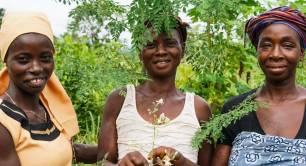Backing bold ideas: How DFID’s IMPACT Programme seeks to catalyse change
The UK government’s IMPACT Programme helps boost impact investment in emerging markets – and has recently announced new partnerships with 17 Africa, the Impact Management Project, and Convergence, as part of a portfolio of initiatives aiming to unlock capital towards the SDGs. Tom Adlam, a former impact fund manager who joined the IMPACT Programme as team leader last summer, reflects on his own impact investing experience and shares three insights that will shape the programme’s priorities in the coming years.
Nearly 15 years ago, with the support of the Gatsby Charitable Foundation and the Rockefeller Foundation, I established a small investment company called African Agricultural Capital (AAC). We didn’t call it an impact investment company at the time, because the term had not yet been coined, but that’s what it was. It made investments in agriculture-related businesses in east Africa, which is often perceived as a high-risk sector for mainstream investors and as a result, means entrepreneurs often have great difficulty in accessing capital.
AAC invested about $8m in 16 companies (in almost all cases as the first external investor) and, despite a few failures along the way, still made a positive gross return on funds invested. Its portfolio included highly successful businesses in avocado farming, hybrid seed multiplication and distribution, poultry, and integrated pest management across east Africa, and helped its investees create more than 2,000 new jobs. The AAC team has subsequently raised a further $60m for three new impact investment funds focused on east Africa.
But was AAC a success or was it a failure?
The answer is that we don’t really know, because we have nothing to compare it to. A typical private equity fund has one overriding measure of success: financial returns to its investors. Impact investing funds have numerous measures of success which, at least at the moment, cannot be reduced to a single criterion, and hence defy comparison. If I want the best impact return, should I invest in renewable energy in south Asia or health care in west Africa?
If I want the best impact return, should I invest in renewable energy in south Asia or health care in west Africa?
And that epitomises one of the biggest challenges of impact investing: what is it? I like the way the Impact Management Project gets away from definitions and focuses on the different ways in which businesses and investors have impact, but sometimes it feels like an amorphous idea whose meaning varies depending on who you talk to.
For instance, a few years ago, U2 frontman Bono cruelly, but memorably, described impact investing as being “a lot of bad deals done by good people”. Others are more optimistic. On the eve of the Global Steering Group conference in Buenos Aires last year, six impact investing leaders issued an open letter, challenging impact investors to reassess the central purpose of capital, move away from the dominant and traditional view that it should maximise financial returns to its owners, and instead be leveraged to benefit all stakeholders. But, at least until impact investing develops a consistent identity, supported by a track record of verified performance, the jury is still out.
Unlocking capital
It was against this background that, in May last year, I took up the role of team leader for the IMPACT Programme, managed by Palladium. The IMPACT Programme was designed by the UK’s Department for International Development (DFID) as a means of supporting and accelerating financing that helps solve critical social challenges in sub-Saharan Africa and south Asia, by helping high impact enterprises and committing to measure impact performance alongside financial performance. It will do this by providing grants to organisations active in the impact investing market, be they private sector or non-profit, by funding innovative ideas that can help unlock impact capital. This capital, we hope, will not only drive economic growth but also help to meet the $2.5tn a year funding gap in delivering the Sustainable Development Goals (SDGs) in developing countries.
|
A £158m programme to advance impact investing DFID’s IMPACT Programme was created in 2012 with a budget of £157.8m over 23 years, aiming to unblock the constraints that prevent impact investing from scaling in sub-Saharan Africa and south Asia, and to reach underserved people as consumers, suppliers, distributors or employees, through innovative business models. It is now managed by Palladium in partnership with Enclude Capital Advisory and The Good Economy, and is focusing on three priority areas; building knowledge and awareness, impact monitoring and measurement, and improved products, tools and services. The first round of grants will support initiatives in designing and testing innovative investment products, tools, and services that increase the flow and distribution of capital aligned to the SDGs. The first grantees – announced in the past month – are: 17 Africa, which the IMPACT Programme is supporting to create a blueprint for an SDG-focused impact investing intermediary in Africa; the Impact Management Project (IMP), for building global consensus and standard methodologies on how to manage, measure, and report positive impacts and ESG risks; and Convergence, to progress the work of the Blended Finance Working Group, a group of donors and other organisations leading the development of blended finance approaches to catalyse more private sector capital towards SDGs. |
In taking on this challenge, the team’s first priority was to fully understand the issues that we needed to tackle, so over the past few months we have met with stakeholders in the UK, India, Kenya, and Ghana and joined global convenings such as the Global Impact Investing Network (GIIN) annual conference and Sankalp Global, meeting with investors, fund managers, enterprises and other organisations serving the impact investing market.
This process has been invaluable in helping both to validate the need for this programme and determining where to focus our efforts. With just 10 years left to fulfil our collective promise and deliver on the SDGs – which represent a US$12tn investment opportunity in assets alone – the urgent need to reshape the entire global investment market is clear. Backed by the global convening and influencing power of DFID, the IMPACT Programme aims to do just that. The question is: where should we focus our efforts to really move the needle?
Three insights
Despite the diversity of challenges and opportunities in the markets where we’re working, three recurring insights stood out.
Identity and mainstreaming
While the practice and identity of impact investing is growing, there is still confusion among stakeholders about what impact investing is. Despite being more than 10 years old now, it seems that the market suffers from very little co-ordination of effort: impact investors and intermediaries tend to operate at an opportunistic rather than strategic level, especially in relation to national development priorities.
Product diversity
Too many impact investors are bound by the need to invest using mechanisms designed to maximise financial returns. This creates significant misalignment between the impact investor, the intermediary organisation, and the investee business. Frequently investment time horizons are too short. Investment intermediaries are also often incentivised by financial rather than impact-based returns, and their risk appetite is low. This means that many impactful businesses cannot source capital which is patient or flexible enough to allow them to deliver business models for the benefit of the communities they serve.
Investment intermediaries are often incentivised by financial rather than impact-based returns, and their risk appetite is low
Scalability and inclusion
Impact investors need to think beyond investments in individual enterprises, and towards full-scale systems change for long-term impact. All too often the conversation is driven by top-down considerations and the priorities of those with voice and decision-making power. We need to think about who we’re creating impact for, and how to foster solutions that can deliver impact for those at the base of the pyramid. Here, the IMPACT Programme will aim to source more locally-driven solutions that can help to broaden the distribution of capital into sectors, countries, and communities which are being left behind.
So, as we complete our first round of grants I’m hopeful that we’ll attract the bold ideas and fresh thinking that address these challenges and deliver exciting new ways of channelling capital to where it is most needed. Certainly, what we’ve seen come in through our first call for proposals and the quality, effort and diversity of concept notes received supports the demand for the Programme. We expect to provide grants to between six and ten initiatives through this window, and to launch a second call for proposals during the second quarter this year.
Find the IMPACT Programme on Twitter, LinkedIn, or on their website; to find out more or share feedback, contact info@theimpactprogramme.org.uk. Header photo: A nursery supervisor watering Hass seedlings at avocado export company Africado, Tanzania (photo credit: Tom Adlam).
Thanks for reading Pioneers Post. As somebody working in the impact economy, you'll know that producing quality work doesn't come free. We rely on paid subscriptions and partnerships to sustain our purpose-led journalism – so if you think it's worth having an independent, specialist media platform to share your news, insight and debate across the globe, please consider subscribing. You'll also be buying social: Pioneers Post is a social enterprise itself, reinvesting all profits to help you do good business, better.




